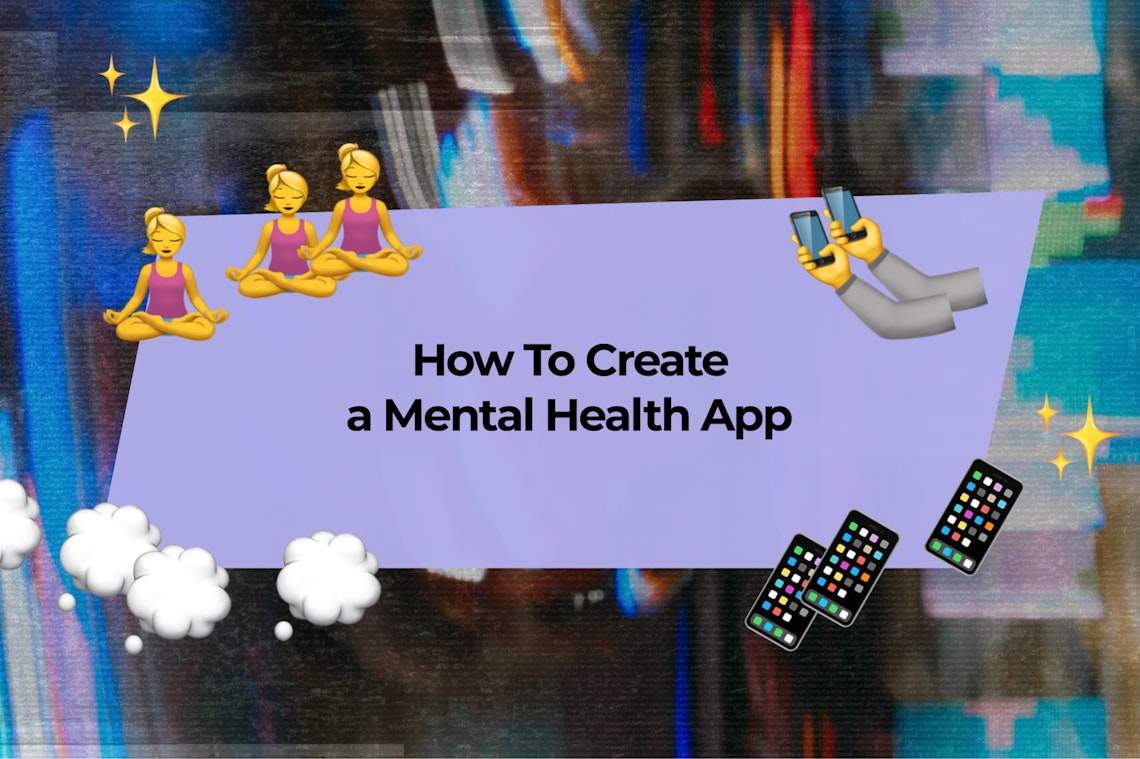Mental Health App Development: Revolutionizing Access to Mental Well-being
Explore the rapidly growing market of mental health apps and discover how they work, their top features, and crucial tips for developing an effective and cost-efficient mental health app. Learn about the advantages of IT outstaffing and the extensive experience of Voypost, a leading development team, through their successful projects like Silatha and Medix.
July 20, 2023
7 min read

Mental Health App Market Review
The mental health app market is experiencing exponential growth, driven by increasing awareness of mental health issues and the need for accessible support. This section provides an in-depth analysis of market trends, user demographics, and key players, highlighting the immense potential and opportunities for mental health app development. The market review includes an exploration of various sub-segments, regional insights, and the factors contributing to market growth. With such potential for growth in this sector, you'll want to explore the ways that you can get involved and create your own mental health app.
The global mental health apps market is experiencing rapid growth, with a value of USD 5.2 billion in 2022 and projected to expand at a compound annual growth rate (CAGR) of 15.9% from 2023 to 2030. The increasing utilization of mental health apps to improve treatment outcomes, rising awareness of mental health, and the benefits of these apps are driving market growth.
The COVID-19 pandemic has further accelerated the adoption of mental health apps, with increased downloads and heightened awareness of mental health as a critical issue. During the pandemic, mental health app downloads in the UK saw a 200% increase from summer 2019 to summer 2020.
Post-pandemic, the mental health apps market is estimated to witness a year-on-year growth of approximately 20% to 22% in the next five years. Stress-related apps are expected to grow significantly due to the rising stress levels during and after the pandemic, particularly among working professionals.
The market is characterized by a shift from traditional care methods to patient-centric and personalized care. Mental health apps targeting depression and anxiety management, meditation, stress management, wellness, and other areas are gaining traction. Studies demonstrating the benefits of these apps and increasing funding opportunities have further fueled their adoption.
Regionally, North America leads the market, driven by smartphone adoption, robust coverage networks, and internet penetration. The Asia Pacific region is expected to exhibit substantial growth due to the increasing demand for connected devices and the adoption of smartphones.
Competition among key players is intensifying, with strategic initiatives such as product launches, partnerships, mergers, and acquisitions driving market growth. Prominent players in the mental health apps market include Mindscape, Calm, MoodMission Pty Ltd., Sanvello Health, Headspace Inc., Flow, and Youper, Inc.
The market's future holds immense growth potential as the demand for mental health apps continues to rise, fueled by technological advancements, increasing awareness, and acceptance of digital and mobile health technologies. The information in this article will equip you to create the best possible mental health app to bring you success in business and well-being to people around the world suffering from mental health issues.
How Does a Mental Health App Work?
To develop an effective mental health app, it is crucial to understand its underlying mechanisms and functionalities. This section delves into the core workings of mental health apps. From user registration and authentication to data security and encryption, symptom tracking, mood analysis, personalized interventions, and data visualization, it covers the essential features that empower users to take control of their mental well-being. By providing a comprehensive overview of how mental health apps function, developers gain insights into the technical aspects necessary for building a successful application.

Transform The Way To Diet with Your Own App
Ready to revolutionize the weight problems through technology? Get a consultation on developing your cost-efficient and effective Diet and Nutrition App. Voypost can guide you in creating a user-centric solution that makes a real impact on people's lives.
Top 5 Mental Health App Features
To deliver a valuable user experience, mental health apps must incorporate features that meet the unique needs of individuals seeking support. This section explores five essential features that contribute to the effectiveness and engagement of mental health apps:
Video Consultations
By enabling virtual face-to-face sessions between users and mental health professionals, video consultations provide convenient access to therapy and counseling services. This feature promotes a sense of connection and allows users to receive personalized support from the comfort of their own homes.
Secure Messaging
Secure messaging functionality allows users to communicate confidentially with therapists or peers, fostering ongoing support, encouragement, and advice. Real-time messaging features facilitate timely responses and enhance the sense of community within the app.
Electronic Health Records (EHR)
Electronic Health Records (EHR) systems ensure the secure storage and easy accessibility of personal health data. This feature enables users to maintain comprehensive health records, simplifies information sharing with healthcare providers, and supports continuity of care.
Notifications and Reminders
Push notifications and reminders play a crucial role in mental health apps by sending timely alerts for appointments, medication schedules, self-care activities, and mood tracking. These reminders help users stay on track with their mental well-being goals and encourage consistent engagement with the app.
Mood Tracking and Journaling
Mood tracking and journaling features empower users to monitor their emotional well-being, identify patterns, and reflect on their progress. Through these features, users can gain insights into their mental health journeys, set goals, and track their overall well-being over time.
4 Tips to Follow for Developing a Mental Health App
Developing a successful mental health app requires careful planning, attention to detail, and a user-centric approach. This section provides four essential tips to guide developers in creating an app that resonates with users and delivers tangible benefits:
Do Not Miss a Business Analysis (Discovery Phase)
Conducting a thorough business analysis is essential to understand the target market, identify user needs, define clear goals, and establish key performance metrics. This phase sets the foundation for developing an app that meets the specific requirements of the target audience.
Design Intuitive (Understandable) UI
Creating an intuitive and user-friendly interface is paramount to ensuring a positive user experience. Intuitive design elements, clear information hierarchy, and thoughtful user flows contribute to an app that is easy to navigate, engaging, and accessible to users of all technical backgrounds.
Test and Analyze the Feedback
Continuous testing and gathering of user feedback are vital to the success of a mental health app. Conducting usability tests, analyzing user behavior and preferences, and iterating based on feedback helps refine app functionality, address pain points, and enhance overall user satisfaction.
Focus on Security and Privacy
Given the sensitive nature of mental health data, ensuring robust security and privacy measures is of utmost importance. Implementing encryption protocols, adhering to data protection regulations (such as GDPR and HIPAA), and maintaining strict confidentiality protocols instill user trust and confidence in the app.

Get a Consultation on Mental Health App Development
Take the first step towards building a game-changing mental health app with Voypost's expert team. From video consultations to secure messaging, we'll help you create an app that empowers mental well-being.
How to Develop Your Mental Health App With Lower Expenses
Developing a mental health app can be a resource-intensive endeavor, but there are strategies to optimize expenses without compromising quality. This section provides valuable insights into cost-saving measures during the development process:
Start With MVP to Save Costs
Building a Minimum Viable Product (MVP) with essential features allows you to validate your concept, gather user feedback, and secure funding before investing in full-scale development. By focusing on core functionalities, you can reduce initial development costs and iteratively add features based on user feedback.
Choose the Right Hiring Model
When assembling your development team, consider different hiring models, such as in-house development, outsourcing, or IT outstaffing. Opting for IT outstaffing can provide up to 40% of cost saving, access to a global skilled talent pool, and flexible scaling options.
Voypost offers a specialized Talent Pool platform for hiring mental health app developers. Their experience in developing successful mental health apps, such as Silatha (a meditation app) and Medix (a telehealth app), ensures the delivery of high-quality solutions. By leveraging their expertise, you can streamline the development process and achieve desired outcomes. The Voypost Talent Pool gives you the tools to access the Top 5% of Ukrainian developers at lower cost than those from North America or Western Europe.
Showcase Projects
Explore notable mental health app projects developed by Voypost, such as Silatha and Medix. These projects demonstrate Voypost's capabilities, innovative solutions, and commitment to user satisfaction. Highlight the unique features, positive user experiences, and successful outcomes achieved through collaboration with Voypost.
By following these strategies and leveraging the expertise of experienced development teams like Voypost, entrepreneurs and organizations can create impactful mental health apps that provide accessible support and contribute to the overall well-being of users worldwide.
In conclusion, developing a mental health app can be cost-intensive, but there are strategies to optimize expenses. Starting with a Minimum Viable Product (MVP), choosing the right hiring model (such as IT outstaffing), and leveraging the expertise of experienced development teams like Voypost can help reduce costs without compromising quality. Voypost, with their specialized Talent Pool and successful projects like Silatha and Medix, showcases their proficiency in developing effective mental health apps.